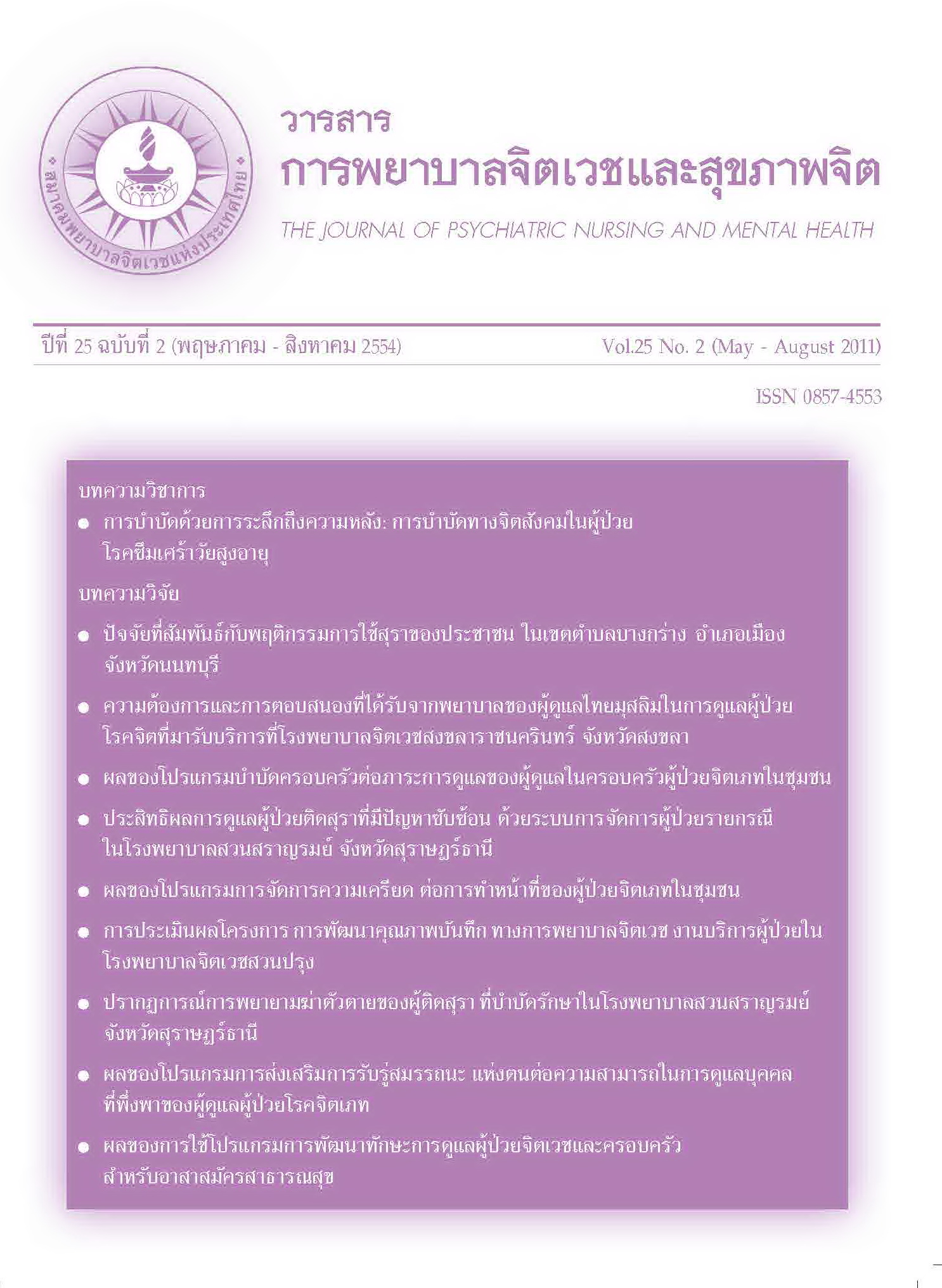ผลของการใช้โปรแกรมการพัฒนาทักษะการดูแลผู้ป่วยจิตเวชและครอบครัว สำหรับอาสาสมัครสาธารณสุข
Main Article Content
บทคัดย่อ
บทคัดย่อ
อาสาสมัครสาธารณสุขที่มีผู้ป่วยจิตเวชในเขตรับผิดชอบ ควรได้รับการพัฒนาความรู้และทักษะในการดูแลผู้ป่วยจิตเวชและครอบครัว เพื่อให้การดูแลช่วยเหลือผู้ป่วยให้สามารถใช้ชีวิตกับครอบครัวและอยู่ในชุมชนได้อย่างมีคุณภาพชีวิตที่ดี การศึกษากึ่งทดลองแบบกลุ่มเดียววัดก่อนและหลังการทดลองครั้งนี้มีวัตถุประสงค์เพื่อศึกษาผลของโปรแกรมการพัฒนาทักษะการดูแลผู้ป่วยจิตเวชและครอบครัวต่อทักษะการดูแลผู้ป่วยจิตเวชและครอบครัวของอาสาสมัครสาธารณสุขกลุ่มตัวอย่างเป็นอาสาสมัครสาธารณสุขที่มีผู้ป่วยจิตเวชในเขตรับผิดชอบ ในตำบลปากหมาก อำเภอไชยา จังหวัดสุราษฎร์-ธานี เลือกกลุ่มตัวอย่างแบบเจาะจง จำนวน 30 คน เครื่องมือวิจัยประกอบด้วยโปรแกรมการพัฒนาทักษะการดูแลผู้ป่วยจิตเวชและครอบครัวสำหรับอาสาสมัครสาธารณสุข และแบบวัดทักษะการดูแลผู้ป่วยจิตเวชและครอบครัวสำหรับอาสาสมัครสาธารณสุข สร้างโดยทีมวิจัย ทดสอบความเชื่อมั่นด้วยสัมประสิทธิ์อัลฟ่า ของครอนบาคมีค่าเท่ากับ .759 วิเคราะห์ข้อมูลโดยใช้สถิติเชิงพรรณนา วิเคราะห์ความแปรปรวนทางเดียวแบบวัดซ้ำ ผลการศึกษาพบว่า
1. ค่าเฉลี่ยคะแนนทักษะการดูแลผู้ป่วยจิตเวชและครอบครัวของอาสาสมัครสาธารณสุขโดยรวม ที่ได้จากการวัดก่อนการทดลอง หลังการทดลอง หลังการติดตามผล มีความแตกต่างอย่างมีนัยสำคัญทางสถิติที่ระดับ .05
2. ค่าเฉลี่ยคะแนนทักษะการดูแลผู้ป่วยจิตเวชและครอบครัวของอาสาสมัครสาธารณสุขหลังการทดลองและหลังการติดตามผล แตกต่างจากก่อนการทดลองอย่างมีนัยสำคัญทางสถิติที่ระดับ .05 แต่หลังการทดลองกับหลังการติดตามผลแตกต่างกันอย่างไม่มีนัยสำคัญทางสถิติ
3. ค่าเฉลี่ยคะแนนทักษะการดูแลผู้ป่วยจิตเวชและครอบครัวของอาสาสมัครสาธารณสุขหลังการทดลองกับหลังการติดตามผลแตกต่างกันอย่างไม่มีนัยสำคัญทางสถิติ
ผลการศึกษาครั้งนี้แสดงให้เห็นว่า การเข้าร่วมโปรแกรมการพัฒนาทักษะการดูแลผู้ป่วย จิตเวชสำหรับอาสาสมัครสาธารณสุขสามารถเพิ่มทักษะการดูแลผู้ป่วยจิตเวชและครอบครัวของอาสาสมัครสาธารณสุขได้ ดังนั้นบุคลากรสาธารณสุขควรนำโปรแกรมการพัฒนาทักษะการดูแลผู้ป่วยจิตเวชสำหรับอาสาสมัครสาธารณสุขมาใช้เพื่อเพิ่มทักษะแก่อาสาสมัครสาธารณสุขในการดูแลผู้ป่วยจิตเวชและครอบครัวต่อไป
คำสำคัญ : การดูแลผู้ป่วยจิตเวชและครอบครัว, อาสาสมัครสาธารณสุข, โปรแกรมการพัฒนาทักษะ
Abstract
Healthcare volunteers responsible for psychiatric patients should receive skills and knowledge training in providing care that brings a good quality of life to patients living with their families in community settings. This quasi-experimental, single group pretest-posttest design, aims to evaluate the effects of a skills development program for healthcare volunteers on providing care for psychiatric patients and their families. The subjects for this study consisted of 30 healthcare volunteers worked in Pakmarhk, a district in Chaiya city, located in Surat Thani province, Thailand. The instruments in this study developed by researchers included the skills development program for healthcare volunteers on providing care for psychiatric patients and their families, and the questionnaire for measuring the skills of healthcare volunteers on providing care for psychiatric patients and their families. The reliability coefficient of the questionnaire was .759. Data was analyzed using descriptive statistic procedures, and one-way analysis of variance (ANOVA). Findings were: 1) the average scores of skills of healthcare volunteers on providing care for psychiatric patients and their families at pretest, posttest, and follow up were significantly different (p<.05), and 2) the average scores of skills of healthcare volunteers on providing care for psychiatric patients and their families at posttest and follow up were significantly different (p<.05) than pretest, whereas the scores at posttest and follow up were not significantly different.
This study provides support for the benefit of utilizing this skills development program to increase healthcare volunteers’ skills on providing care for psychiatric patients and their families. Therefore, it is recommended that healthcare personnel undertake this skills development program before providing care for psychiatric patients and their families.
Keywords : Care for psychiatric patients and their families, healthcare personnel volunteers, skill development program
Article Details
บทความที่ได้รับการตีพิมพ์แล้ว เป็นลิขสิทธิ์ของสมาคมพยาบาลจิตเวชแห่งประเทศไทย


